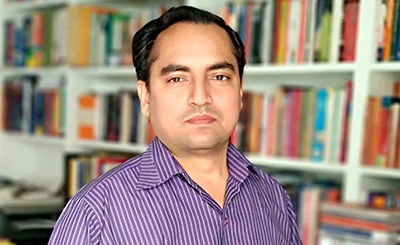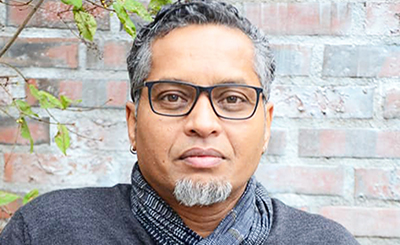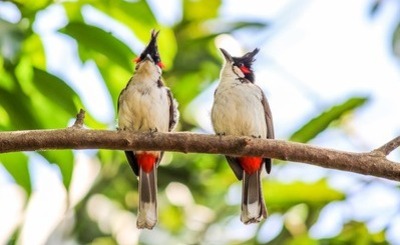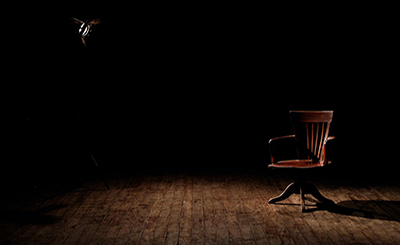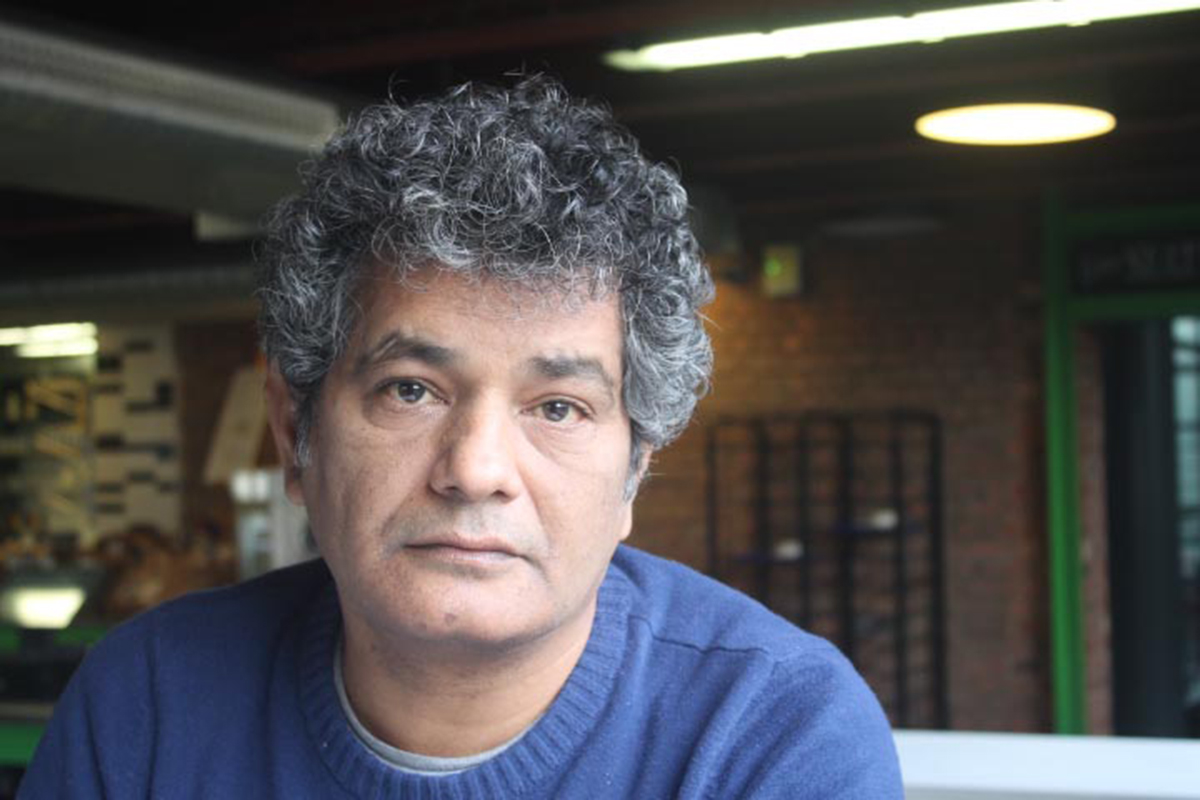
Mohammed Hanif. Photo courtesy of the author
“Humorous writers tend to be sad at heart,” said Czech writer Josef Skvorecky (1924-2012) whose work was distinguished by its far-reaching historical consciousness and sense of social engagement, unmistakable, unrestrained wit, and a long-standing concern with human rights, in an interview to The Paris Review in 1989.
Pakistani author Mohammed Hanif, whose fiction is enlivened by an irrepressible satirical strand, exhibits the sadness of his heart at the state of affairs around the world in his third novel, Red Birds (Bloomsbury), which dwells on the absolute absurdity of never-ending war and the impossible dream of world peace. As a writer witness to global conflicts that seem to have gone on forever, Hanif, in his new novel, endeavours to make sense of, and make you see the senselessness of, wars.
Written in first-person narrative and told by multiple voices, including a Mutt, Red Birds opens with Major Ellie, an American pilot who has crash landed in a desert, scrounging for food and water in an unnamed, godforsaken part at the end of the world, making do with energy biscuits and passion fruit smoothie, shoveling the sand in order to rescue the 65-million-dollar plane even as he hopes to be rescued himself, chasing a medley of mirages. Not far from the desert is a Camp, the Camp Major Ellie was supposed to bomb, and an abandoned Hangar, a testimony to the presence of men and machines in the not-so-distant past.
The Camp is inhabited by an interesting array of characters who alternately take over to tell their tales. They include 15-year-old self-made entrepreneur Momo, his Mother Dear and Mutt. Momo’s elder brother, Ali, has been missing since he got “contractual employment” at the Hangar at the behest of his Father Dear, who worked at the Hangar, handling supplies and logistics, and occasionally ran workshops on youth affairs, mostly sex education. “I can’t live here and enjoy the comforts of the Camp while Bro Ali remains missing, living in some hellhole and god knows what they are gonna do with him. There were boys who didn’t come back before, but they were not Bro Ali. When you are pushed to the wall you have to go to war because there’s nowhere else to go,” muses Momo.
The Hangar may have been abandoned but the war is far from over or so does it seem, with trails of devastation and desolation engulfing the Camp, a place which even the God had left long time ago, as Mutt informs us. Grief wafts out of the stoves in people’s houses here. Mutt paints a picture of the missing boys at the Camp: “Someone was sent, someone didn’t come back. There is a school uniform shirt, pressed and waiting in the cupboard, a deflated football, half-finished drawings of pitchers and crows on the walls. The boys who have gone for a bit, the boys who will come back soon.”
In the wake of the war, so many lives are at stake. Many are reported missing, scores are dead. And then there are the living deads, coping with the grief of having lost their loved ones. But, in the new world order, war has come to be seen as a necessary evil. And attaining peace hardly seems to be in the realm of possibility. Colonel Slatter, who had preceded Major Ellie in the mission to bomb the Camp but ended up crashing his plane and “evaporating into thin air”, lays down the foundations of the inevitable war: “We used to have art for art’s sake; now we have war for the sake of war. No land captured, no slaves taken, no mass rapes, fuck their oil wells, ignore their mineral deposits. You can outsource mass rapes. War has been condensed to carpet-bombing followed by dry rations and craft classes for the refugees. People who had not left their hamlets for centuries, goatherds who believed in nothing but grassy fields and folk music, women who had never walked beyond the village well, now they could all go and live in UN tents, eat exotic food donated by the USAID and burp after drinking fizzy drinks.”
It has been seven months since the bombing stopped and the Hangar fell silent. As the people at the camp try to pick up the pieces of their lives, Lady Flowerbody, an aid worker, arrives at the Camp for her research on the teenage Muslim mind, staying with Momo’s family, bombarding Momo with questions like “how do you feel?” Momo wonders: “Why does she think anybody is gonna tell her about their real feelings? And what exactly are her own feelings about all these fake feelings that she keeps collecting?”
War has left a trail of memories. The people at the camp cling to these memories, hoping for a better day to dawn, a day when their loved ones would return home with the promise of a better life. “What are people if not the sum total of their memories,” Mother Dear reflects towards the end of the novel. The people at the camp, however, are also the sum total of their misfortune, clinging to memories, but trying to rise above their misfortune with a little help from God, “the brilliant author of our life stories and the abrupt ender of them.”
In Red Birds, Hanif wanted to tell “an unfamiliar story and then make it familiar”. “I wanted to drop you in a desert and then take you home, your home, my home. We all watch distant forgotten wars while having our TV dinners and then pretend they are not happening. TV brings atrocities into our living rooms and we are ok with that, I guess I wanted to go out my living room and imagine what life is like if a war has been forgotten,” says the author, who was longlisted for the Man Booker Prize for his debut novel, A Case of Exploding Mangoes, in 2008.
Excerpts from the interview:
Shireen Quadri: Red Birds, your third novel, is essentially a tragic story about the absurdity of wars that the occupiers — the western world — have embarked upon for decades proffering silliest of excuses and with vested interests, but with the avowed aim of “liberating” these lands — the Muslim world — by recklessly and arbitrarily bombing them on a whim, with misplaced vengeance. What was the trigger for this novel?
Mohammed Hanif: It wasn’t triggered by a single incident or a thought. I think it’s the life that I have lived, we have lived that goes into writing a novel. I think Afghan war which started when I started school and now my son has started university and an Afghan war still rages on. I think Kashmir war, (conflict, insurgency, war of liberation whatever name you want to give something where you have to keep killing vast numbers of people at regular intervals) started way before I was born. So I guess the trigger was all the children of all the wars that we are vaguely sympathetic to but can’t be bothered to hear their voices.
Shireen Quadri: In Red Birds, you move from the familiar landscape of your country, where your two previous novels were set, to an unnamed war-torn desert at the end of the world, which could actually be anywhere — Kabul, Kandahar or Quetta, or Yemen, Syria or Libya. Do you think the unnamed setting lands the story universality and captures he ubiquitousness of wars better?
Mohammed Hanif: I hope it does. I wanted to tell an unfamiliar story and then make it familiar. Drop you in a desert and then take you home, your home, my home. We all watch distant forgotten wars while having our TV dinners and then pretend they are not happening. TV brings atrocities into our living rooms and we are ok with that, I guess I wanted to go out my living room and imagine what life is like if a war has been forgotten.
Shireen Quadri: The novel, you have said in many interviews, is a funny book about sad things. Was it more challenging to satirise something so inherently tragic, inject your trademark dark humour and dollops of deadpan irony into the narrative replete with sorrow, devastation and loss that all wars eventually lead to?
Mohammed Hanif: There was a great Urdu poet Munir Niazi, one of his line is: sawal ka jawab bhi, sawal mein mila mujhay. I found the answer within the question. I think that works here.
Shireen Quadri: The novel is told through the short bursts of monologues by multiple narrators. And yet all of them seem to echo your unmistakable characteristic voice which your readers can identify in the irreverent tone, in paragraph after paragraph filled with savage sentences or turn of phrase bursting with wit. Do you think putting more of you in this novel makes it much more personal? How did you settle on their names?
Mohammed Hanif: I think it’s more personal than my two previous novels but then I have to ask how can a writer be impersonal, objective? I have only covered one boxing match in my life, here in Karachi. And I knew which boxer I wanted to win without knowing anything about him. So every character is basically a strain of madness in my head. Why the names, is a good question. I struggle with them a lot. Famous writers go to graveyards looking at tombstones and find names for their characters. I am too lazy to do that. I have a very enterprising nephew who is called Momo. When I started writing he was only ten and knew about every type of evil in the world. Mutt, because I live with one and I thought he’ll object to his proper name being used. I was trying to do something with Ellie and Ali but then that’s obvious.
Shireen Quadri: How different was to incorporate in the narrative the voice of a worldly-wise Mutt? Do you think it helps to see war as an equaliser which destroys humans and animals alike?
Mohammed Hanif: One of Pakistan’s greatest novelists, Abdullah Hussain, had written a partition in his majestic novel Udaas Naslain, a scene where abandoned cattle roamed around the green fields of Punjab, scared of humans because they had seen all the way a man can cut up another man. I think that stayed with me for a long time. The animals don’t get a voice in that great novel though. But I have spent too much time with mildly puzzled mutts so I had to give them a voice.
Shireen Quadri: The novel is divided into three chapters: In the desert, in the camp and to the Hangar. How did you settle on its structure? Did you set out to bring the perpetrators and victims, the collaborators and facilitators of the war together?
Mohammed Hanif: Not at all. It’s more like organizing something in my head which is completely gone out of my hands. Beginning, middle, end. I think this is how life works.
Shireen Quadri: All those who have a stake in the war, having been affected by it some way or the other, get to tell the story from their perspective. While Mother Dear gets to have the last word, Father Dear doesn't get a voice at all. Was it a conscious decision? If he had got a voice in the novel, what could his monologues be possibly about?
Mohammed Hanif: I think he would be whining like some fathers do (I am one, I should know) and can always explain everything away by saying I did it for my children, they are always pleading innocence, believing in innocence of the falling bombs, there are too many men pleading that innocence, so Father Dear’s is kind of obvious. We are suffering the world because he collaborated in making this world.
Shireen Quadri: How much did your initial draft change during the process of writing this novel? Did you, at any stage, contemplate telling this story some other way?
Mohammed Hanif: Every single day. I started it as a third person omniscient narration, I had a god-like storyteller who kept disappearing on me. And then I risked letting the characters speak for themselves. So, yes, while you are writing, every day is a regret but when you are done, if you are ever done, then there are no regrets. One is ready for fresh regrets.
Shireen Quadri: Elegiac and anarchic, the novel seems to be an act of mourning the missing-dead. How did you settle on red birds as a metaphor for the missing, the abducted, the dead and the disappeared in the wake of wars?
Mohammed Hanif: Shah Hussain Punjabi poet, who named himself after his lover and became Madhu Laal Hussain. Laal. Red. He writes beautiful poetry and if I follow in his path may be there will be some meaning in my work. So he uses red a lot. Give a poet, even a Sufi poet, a lover called Laal and he is going to make sure that he weaves in his lover’s name a lot. Shah Hussain gave me the title although if he was around he might totally deny it.
Shireen Quadri: The multiple narrators are joined by one trait: their atheistic credo. Does this reflect your own despair over any divine intervention to stop the never-ending wars on earth?
Mohammed Hanif: May be wars ARE the divine intervention. When people are in despair they pray and that’s what many people are doing in Red Birds. When god leaves you, you remember him even more.
Shireen Quadri: Your novel comes close on the heels of Michael Ondaatje’s Warlight. “Wars don’t end. They never remain in the past,” writes Ondaatje. While much of what has gone into Red Birds comes from your journalistic research, do you have any favourite war novel? What did you read during the course of writing this novel?
Mohammed Hanif: It took me seven years to write so I read a lot of stuff unrelated to what I was writing. The war novels, of course: Abdullah Hussain’s Udaas Naslain which has large chunks about Indian soldiers in World War II. Colonel Mohammed Khan’s memoir about his time in the Second World War titled Bajang Amad was the first book I ever read. I also keep reading and talking to lots of journalists living and working in what we call conflict zones.
More from The Byword
Comments
*Comments will be moderated





